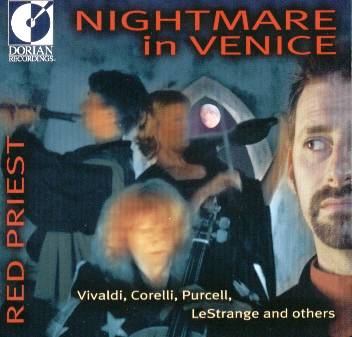Red Priest, the Cirque du Soleil of baroque performance
ensembles, is back. Their first Dorian CD, Priest on the Run,
gave us thunder bestrewn Vivaldi, Handel, Purcell, Telemann and others
Ė and now they reprise their namesake Vivaldi, as well as Purcell, but
add an English Fantasy suite (principally Robert Johnson but also one
piece by the little known Nicholas LeStrange) adding a dash of Castello
and Cima, and a soupçon of Leclair. Their finale is an outrageous
Fantasy on Corelliís La Folia in the version for recorder and
continuo and one guaranteed to shake the very bones of those generations
of departed violinists who essayed it in the original version in rather
more Ė shall we say Ė genteel fashion.
Since that last CD Howard Beach has replaced Julian
Rhodes who died, aged only thirty-seven, in 2001. Otherwise Piers Adams
plays the recorders, Julia Bishop the violin (and some banshee wailing
of which more below) and Angela East is the cellist. The rationale for
this disc is the fantastic. The Nightmare Concerto of Vivaldi
was originally written for flute or recorder and string orchestra and
has been arranged by the group, as have other items here. Vivaldiís
Concerto Grosso in A minor (from LíEstro Armonico) acts as the
centrepiece of the recital, once more in a small ensemble reduction
Ė though it hardly fits the bill in terms of the ghoulish schema Red
Priest enact elsewhere. But it does act as a healing refuge at least
from Cimaís Sonata a Tre, written in the then current Stylus
Phantasticus, and the other devilish goings-on in this characteristically
dramatic production.
We are immediately plunged into the grotesquery of
Vivaldiís La Notte in which virtuosity, finesse and crazed sonorities
evoke the nocturnal phantasmagoria of a truly fervid imagination. The
jagging, jutting and sawing are writ huge in this performance and my
main concern centres on the sonorities in the Chase, the final movement,
in which things seem to get rather overheated. The so-called English
Fantasy Suite opens with Johnsonís suitably devilish Satyrís
Masque but also features an aspect of Red Priestís recorded performances
to which Iím less sympathetic Ė the fade out ending (and itís not the
only example). In LeStrangeís The Furies Piers Adams unleashes
a veritable torrent of dramatically vibrated flute playing; itís reminiscent
in Red Priestís arrangement of South American pipe music and in The
Witchesí Dance we have a surfeit of Frank Zappa gnawing and gnarling
string playing Ė which is contrasted with an elegant folk-like simplicity
(topped by the hag-like wails of Julia Bishop). The inherent theatricality,
the juxtaposed sonorities and stylistic clashes are all Red Priestís
now accustomed province but some sensitive baroque ears will need a
health warning before this disc is removed from the shrink wrap.
However Cimasís Sonata a Tre opens in sensitive
fashion Ė desolate and full of feeling Ė the yelp at 2.30 is another
side of the workís nature and maybe Red Priestís as well. The Concerto
Grosso, a short three-movement work, begins with tasteful ebullience
- these players have plenty of sensitivity when required and quite plainly
considerable reserves of technical prowess as well Ė before some shimmering
harpsichord playing launches Piers Adamsí recorder. Howard Beach seems
to thrum the harpsichord in the concluding Allegro Ė a kind of running
water effect and delicious Ė over which first the skittering violin
and then the expressive cello make their entries. They certainly donít
stint the horror in the Dance of the Followers of Night from
Purcellís The Fairy Queen Ė string bulges galore, recorder billowing.
In Castelloís Sonata Decima they seize on the potential for powerful
contrast Ė lissom elegance and dramatic roistering sonorities Ė but
the effect, to me anyway, is really rather pulverising. Red Priest have
through long experience of baroque performance practice internalised
such features as dramatic dynamic contrasts and giddying tempi and it
is well within their capacity to detonate a work in this way. Whether
itís to the advantage of the work is a moot point.
Still thereís little denying the vivacious wit (albeit
with thunderous cello accents) of Leclairís Demon Air No. 2 or
the shuddering aerobatics of the Simphonie. Now about the Fantasy:
the notes are cagey but this is what I hear, some of it at least. It
opens by presenting the spine of the melody, then continues with crypto
exchanging of twos (in jazz terms), overblown embouchure work on the
recorder, a pause for the solemn appearance of the Elgar Cello Concerto
(itís true folks), a slide so garish I suggest you listen with mufflers
in a darkened room, some middle eastern cornucopia, a visit to sunset
in Khartoum (I couldnít make it up Ė special bow for recorder and harpsichord),
a Greek wedding dance, slapped bass à la Pops Foster (Angela
East the cellistic culprit) and Ė bear with me, itís nearly over Ė a
guest appearance by the ghost of Artie Shaw and his Gramercy Five (welcome
back Johnny Guarnieri). Oh yes and flutter tonguing, Bach and some rapacious
heavy rock. Well, itís not Arthur Grumiaux thatís for sure. But that
is Red Priest Ė entertaining, naughty, Iím not entirely sure
I could live with it on disc but Iíll be sure to be at their next concert.
Iíll be the guy in the earmuffs.
Jonathan Woolf

